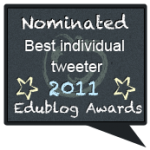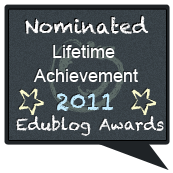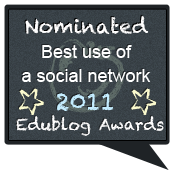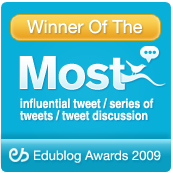I was always intrigued by the saying, “I taught him everything he knows, but not everything that I know!” I always thought that was a pretty clever saying. It was also true of educators in years gone by. They were the content experts. If you wanted knowledge, these experts had it. People paid good money to travel to the places where these content experts delivered their wares, universities, colleges and monasteries. Knowledge was a commodity and, if the expert held anything back, a student’s only recourse for more, was to search the libraries. Ah, the simplicity of the bygone days. As public education came about we had many more content experts and many more libraries. That was the model, listen to experts and read content in books housed in academic or public libraries. Since all of education was based on print media every teacher was media literate, if they could read and understand.
Media began to change first with TV, and then with computers offering other means of content delivery. Television was easily understood and adopted quickly by educators. VCR’s were more easily handled than threading those ratchety, click-clickety-sounding 16 mm projectors. Video cassettes made everything user-friendly. I always thought that Social Studies teachers were the quickest to use video to deliver content. It was suited for them. Some teachers even allowed students to create content with video. That was innovation back in the day.
What threw the monkey wrench into the sprocket works of education was the damned internet and all of the stuff that it delivers. It comes in mass quantities and things are always changing, or evolving, or, in some cases, disappearing altogether to be replaced by something else. Being a content expert is easier if the content doesn’t change. Commit to it once, and you are done. The idea that there might be constant change and additional information happening on a frequent basis changes the dynamic of the content expert’s job. If content changes faster than the expert can adapt, maybe the expert needs to change the strategy. Teach students what to look for, and what to value in content, so they can access it in whatever form it is being delivered. More importantly, allow students to use those tools of technology and information to create new content and share it with others.
In order to do this, Educators, who are still the content experts, need to be literate in the area of media. They need to be aware of the means of delivery and learning tools for creation of content for their students. Gutenberg’s printing press innovation carried education for years. However, it is now a new digital era and Gutenberg technology is beginning to fade. I am sure someone told Gutenberg that they would never read his printed text because they loved the feel and smell of hand written scrolls. Guttenberg would probably feel delighted to know that people feel that very same way about his printed text today. They don’t like digital and prefer the printed text. Not so much the younger generation living with texting on 4 inch screens, digital readers, iPad and tablets.
I recently read a post defining Information Literacy, Digital Literacy, and Digital Citizenship. Information Literacy, Digital Literacy and Digital Citizenship by Maggie Hos-McGrane. It was also a Topic on a recent #Edchat discussion. After considering all of this, as well as a presentation that I am working on dealing with the subject, I have made some personal observations. I really believe that, as content experts, most educators are information literate. That would mean: To be information literate, a person must be able to recognize when information is needed and has the ability to locate, evaluate, and use effectively the needed information.
Where I begin to have my doubts however, is in my day-to-day contacts with educators throughout the year. I supervise student teachers requiring me to travel to many different schools contacting many different educators. I have not accumulated data, or even done a survey, but in my many encounters with educators they have often expressed objections to the use of technology tools for learning in education. It is not necessarily the actual use of technology that is being objected to, but rather the need for the educator to have to personally learn the technology. This may be the result of many things such as: bad professional development experience, lack of support to try new things, control issues, or simply not wanting to have to learn anything more. This is where I begin to be concerned. It is my OPINION that there are too many educators falling into this category. They have little chance to meet the next requirement of Media or Digital Literacy. Digital literacy is the ability to locate, organize, understand, evaluate and analyze information using digital technology.
How many digitally illiterate teachers in a school does it take to begin to affect the way kids are learning? This definition does not call for technology mastery, but rather simply an ability to use technology. YES, you can be a good teacher without using technology. Your students however in order to be Lifelong learners, as we all want them to be, will need a knowledge of these things to access and create content as they move further into their future. No one will be resurrecting Guttenberg technology to support outdated methods of teaching. Technology tools are no longer an option left to a teacher’s discretion. Students without a digital literacy will be handicapped as learners in their own lifetime.
How we teach often reflects how we learn. New learners have new tools. Many teachers learned and teach with old tools. They are comfortable with old tools, but a teacher’s comfort is not the goal of education. Additionally, the variety of tech tools for learning offer great opportunity for success with differentiation. Educators need to be aware. What good is it being a content expert if no one is getting the message?
Good educators need to model learning. Not being media literate in the 21st Century is a very POOR model. A teacher’s content expertise is a small rival to the internet. Teaching and guiding kids to harness that content should be the goal. Projects and speeches on paper, display boards and podiums have been replaced by many tech alternatives. Kids get it, some teachers don’t! We shouldn’t teach kids to be keepers of content, but learners of content, better yet, creators of content. It needs to be a lifelong process and tech tools are required.
If relevance requires continuous learning and it is necessary for acceptance, how do educators keep up without knowledge of media literacy? It is a professional responsibility! Media Literacy requires people enter a world that gives up a great deal of control. Many educators are not prepared for that. Comfort and control issues however, do not excuse educators from being media literate. Even one illiterate educator in a school is one too many. An even worse offense is a media illiterate administrator. We all need to model learning, especially our leadership, and moving forward, technology will be a part of that learning.











